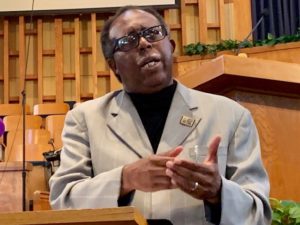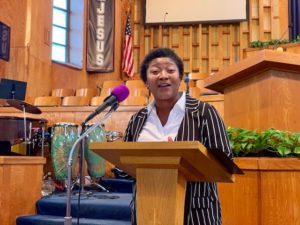Austin Fights for Voting Rights

With crucial 2020 elections looming and voter suppression making headlines from Texas to Georgia to Indiana, the Voting Rights Act anniversary this month carried even more significance than usual.
Public Citizen, MoveOn and others organized a voting rights vigil in Austin to celebrate the law on Aug. 6, the date in 1965 that President Lyndon Johnson signed the landmark legislation. The spirited event at David Chapel Memorial Baptist Church drew dozens of community members and featured a stellar roster of speakers including elected officials, community activists and voting rights advocates.
In addition to cheering the landmark law, the gathering called on Congress to restore protections in the Voting Rights Act that were gutted by a 5-4 Supreme Court decision in 2013. The urgency of the moment was palpable – and warranted.
“Voting rights are under attack today in Texas and across the United States,” said Adrian Shelley, director of Public Citizen’s Texas office. “ We not only honored the Voting Rights Act but renewed our commitment to protecting the right to vote. We must be constantly vigilant to protect this most fundamental right for all citizens. ”
“The Voting Rights Act is without a doubt the single most impactful piece of legislation in the history of the civil rights movement,” added Nelson Linder, president of the Austin NAACP. “The fact that it is constantly under attack is a confirmation of its importance.”
The day after the vigil, our friends at the Texas Civil Rights Project sued the state on behalf of two Texas voters whose mail-in ballots were rejected after local officials determined the signatures on their ballots were not theirs. The ballots were, in fact, theirs, and the voters were understandably outraged by this arbitrary decision that stripped them of a fundamental American right.
“Even though Texas’ mail in-ballot process should make voting easier for voters…the current flawed process leads to the unlawful disenfranchisement of these Texas voters,” the lawsuit filed in San Antonio federal district court said.
Meanwhile, the Brennan Center for Justice, which tracks voter suppression among other issues, released a report this month that detailed how between 2016 and 2018, counties with a history of voter discrimination purged voters from their rolls at rates much higher rates than counties that hadn’t been found discriminatory. Texas officials tried to purge nearly 100,000 voters from the state’s rolls earlier this year but got smacked down by the courts.
Of course, the Voting Rights Act of 1965 aimed to increase – not diminish – the number of registered voters in states, including Texas, where there was a record of discrimination, especially against people of color. But a 2013 Shelby County v. Holder Supreme Court decision stripped the landmark law’s pre-clearance requirements. That means states with a history of voter discrimination, including Texas, now no longer need Justice Department or federal court approval to enact laws making it more difficult for people to vote. In fact, Texas officials announced their intent to adopt the nation’s strictest voter ID laws within 24 hours of the Supreme Court ruling six years ago. That voter ID policy stands today.
The good news is legislation currently pending in the U.S House and Senate – the Voting Rights Advancement Act – would restore pre-clearance and return the Voting Rights Act to its original intent. The bad news is that the Republican-controlled Senate led by Kentucky’s Mitch McConnell won’t touch the legislation even if it gets approved in a U.S. House controlled by Democrats. This is a great example of why elections matter.
“When some of the younger people here today will gather for the 100th Anniversary of the Voting Rights Act in 2065, I hope that the term ‘voter suppression’ will only exist in history books,” Bruce Elfant, Travis County’s Tax Assessor-Collector, said at this week’s vigil. “Going forward, we must continue to counter efforts to restrict voting rights – in the public forum and at the state and U. S. capitols. We must make calls, write letters and send e-mails. We will need to get out our marching shoes and our voter registration clipboards. And WE HAVE TO VOTE.”
 Austin City Council Member Natasha Harper-Madison summed it up.
Austin City Council Member Natasha Harper-Madison summed it up.
“It took Congress 95 years to add teeth to the Fifteenth Amendment in the form of the Voting Rights Act of 1965, one of the greatest triumphs in black American history,” she said. “But with voting rights once again under assault all over the country, we know that even after you win it, you still have to keep your eyes on the prize.”
For some more perspective on the shameful history of voter suppression in Texas, listen to Public Citizen’s Michael Coleman discuss the issue with Texas Public Radio on a broadcast that aired Aug. 2. The segment begins at the 20:o0 minute mark.